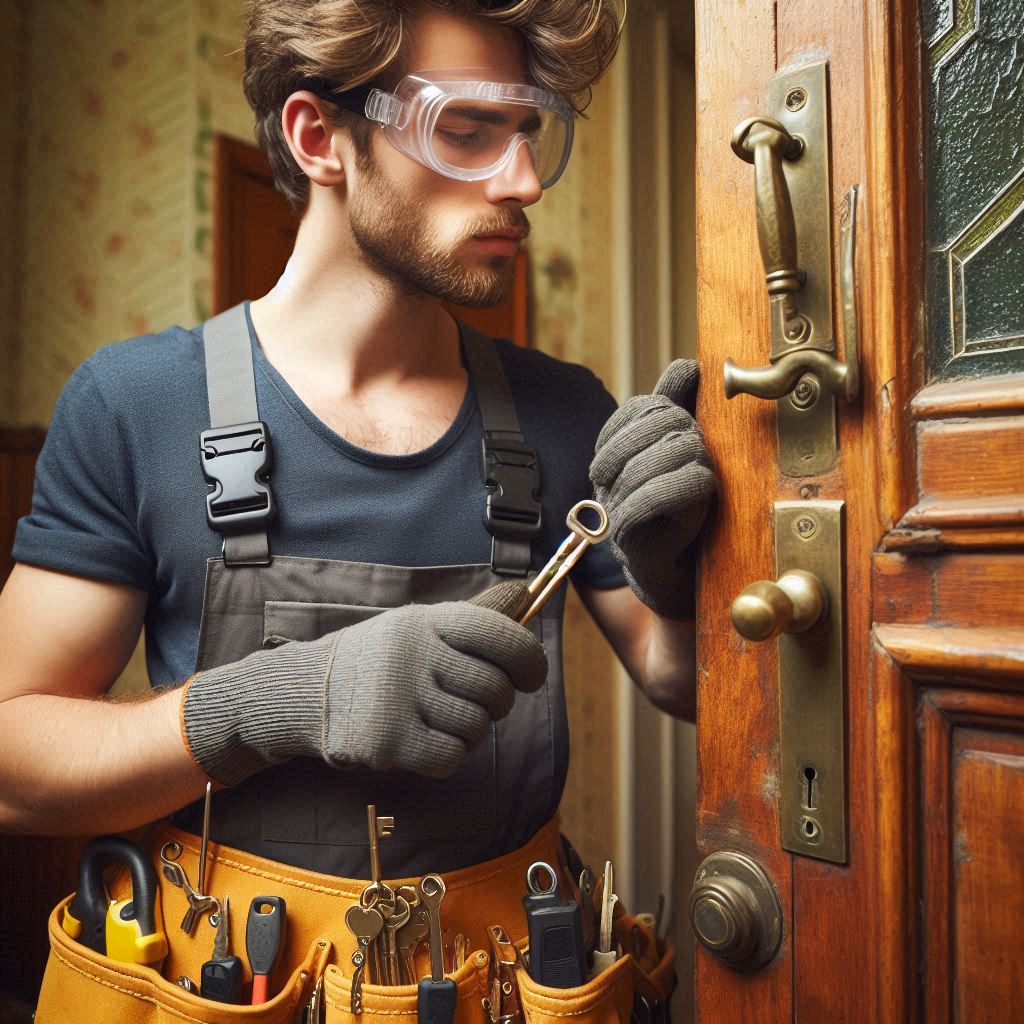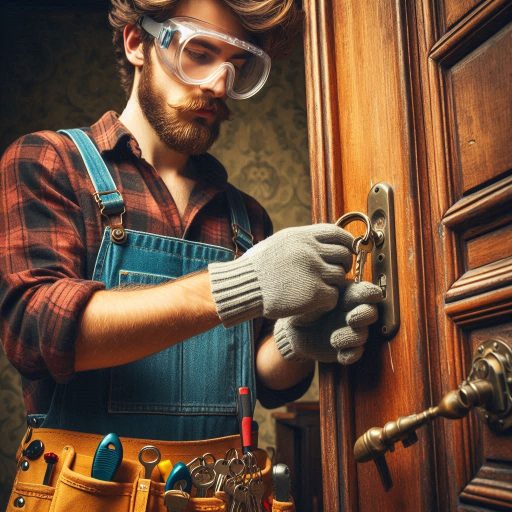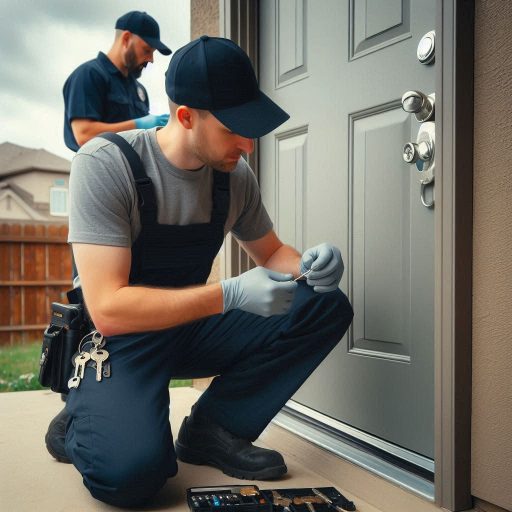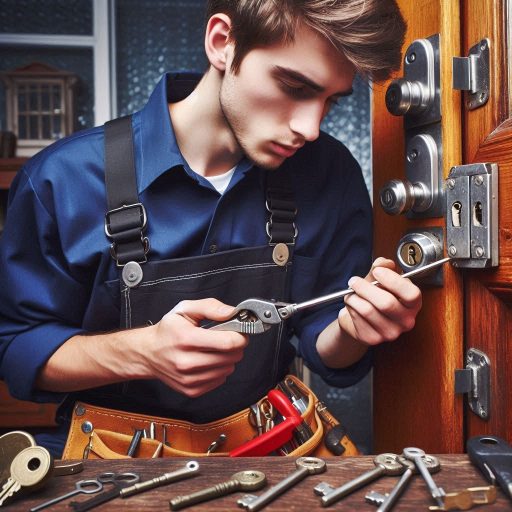Introduction
Locks and keys play a vital role in our daily lives.
They provide security and peace of mind for our homes, cars, and businesses.
When we use locks, we trust that they will protect our valuables.
However, improper care can lead to malfunctioning locks and lost keys.
Maintaining locks and keys is essential for their longevity and performance.
Regular care helps ensure that they function smoothly and effectively.
Neglecting them can result in costly repairs and compromised security.
Many people overlook the simple tasks involved in lock maintenance.
They often wait until a lock fails or a key breaks.
This can lead to frustration and vulnerability to security threats.
By understanding how to care for locks and keys, you can avoid these issues.
Simple practices can significantly extend their lifespan and functionality.
Investing time in proper care will save you money in the long run.
In this blog, you will discover valuable tips for maintaining locks and keys.
These tips will help you protect your property and enhance your security.
Taking proactive steps ensures that your locks and keys remain reliable and effective.
Regular Cleaning and Maintenance
Caring for your locks and keys is essential for their longevity and functionality.
Regular cleaning and maintenance help prevent jams and ensure smooth operation.
Dirt and debris can accumulate in locks, causing them to malfunction.
Therefore, take time to clean your locks regularly.
Use a Soft Brush or Can of Compressed Air to Remove Dirt and Debris
Start by using a soft brush to remove dirt from the lock’s surface.
A small paintbrush works well for this task.
Gently brush away any visible dirt and grime.
If you notice debris inside the keyhole, use a can of compressed air.
Aim the nozzle into the keyhole and give it a few short bursts.
This action will dislodge any particles without damaging the lock.
Lubricate the Lock Mechanism with a Graphite Lubricant or Silicone Spray
Once you’ve cleaned the lock, it’s time to lubricate the mechanism.
Proper lubrication ensures smooth key insertion and turning.
For this, use a graphite lubricant or silicone spray.
These types of lubricants provide excellent protection without attracting dirt.
To apply lubricant, insert the key into the lock.
This step helps you access the internal mechanism.
Spray a small amount of lubricant directly into the keyhole.
Avoid over-applying, as excess lubricant can attract dust and debris.
After applying the lubricant, remove the key and wipe off any excess.
Now, gently work the key in and out of the lock a few times.
This action helps distribute the lubricant evenly within the mechanism.
You should feel a noticeable difference in how smoothly the key turns.
Regular lubrication not only enhances functionality but also prevents wear and tear on the lock.
In addition to cleaning and lubrication, inspect your locks regularly.
Look for signs of rust, corrosion, or other damage.
If you notice any issues, address them immediately.
Delaying repairs can lead to bigger problems down the road.
Make it a habit to check your keys for wear.
If a key becomes bent or damaged, replace it promptly.
Using a damaged key can cause additional strain on the lock.
Keeping spare keys on hand can save you time and frustration.
Lastly, consider the environment where your locks are located.
If they are exposed to harsh weather conditions, take extra precautions.
Protect outdoor locks with covers or shields to prevent rust and deterioration.
By following these simple steps for regular cleaning and maintenance, you can extend the life of your locks and keys.
With a little effort, you ensure they remain reliable and secure for years to come.
Regular upkeep not only improves functionality but also enhances your overall security.
Read: Essential Skills Every Pet Groomer Should Have
Avoid Harsh Chemicals
When caring for your locks and keys, avoid using harsh chemicals.
These substances can cause long-term damage, leading to costly repairs or replacements.
It’s crucial to understand the impact of certain products on your locking mechanisms.
Do Not Use WD-40 or Other Oil-Based Lubricants
Many people mistakenly believe that WD-40 is a good lubricant for locks.
However, this oil-based product is not suitable for lock maintenance.
WD-40 can leave a residue that attracts dirt and dust.
Over time, this residue builds up inside the lock, causing it to jam.
Instead of improving performance, WD-40 may worsen the situation.
Oil-based lubricants can also break down the internal components of the lock.
They may cause parts to become sticky or sluggish.
When a lock mechanism becomes sticky, it may require professional assistance for repairs.
Such issues can be both time-consuming and expensive.
Therefore, always opt for lock-specific lubricants like graphite or silicone sprays.
Harsh Chemicals Can Damage the Lock and Key Over Time
In addition to oil-based lubricants, avoid using other harsh chemicals.
Products such as bleach, ammonia, or acetone can cause irreversible damage.
These chemicals can corrode the metal components of the lock and key.
Corrosion weakens the integrity of the lock and can lead to premature failure.
Chemical reactions can also discolor the surface of locks and keys.
This discoloration not only looks unappealing but may indicate damage beneath the surface.
When locks appear corroded or discolored, they may no longer function correctly.
Instead of harsh chemicals, choose gentle cleaning solutions.
A mixture of mild soap and water can effectively clean locks and keys.
Use a soft cloth or sponge to apply the solution.
Gently wipe down the surfaces, removing dirt and grime without causing damage.
After cleaning, make sure to dry the locks and keys thoroughly.
Moisture left on surfaces can lead to rust and deterioration over time.
Keeping locks dry ensures they remain functional and secure.
For routine maintenance, always read the labels of any products you use.
Ensure they are safe for metal and specifically designed for locks.
Following these guidelines can prevent unnecessary wear and tear on your locking mechanisms.
If you accidentally apply a harsh chemical, clean the area immediately.
Use a soft cloth to wipe away any residue.
You may need to reapply a suitable lubricant to ensure smooth operation.
By avoiding harsh chemicals, you protect your locks and keys from damage.
Taking this simple precaution will extend their lifespan and enhance their functionality.
Invest a little time in proper care to avoid costly repairs down the line.
Remember, your locks play a vital role in securing your home and belongings.
Proper care ensures they remain reliable and effective for years to come.
Read: How to Handle Emergency Situations in Pet Grooming
Key Organization
Keeping your keys organized is essential for easy access and to prevent loss.
An organized key system can save you time and reduce frustration.
Here are some effective strategies to help you maintain key organization.
Keep Keys Organized in a Designated Spot
Designating a specific location for your keys is crucial.
Choose a spot near the entrance of your home, like a hook or a bowl.
Always return your keys to this spot after use.
By doing this, you will always know where to find them.
Consistency is key when establishing your designated spot.
Make it a habit to place your keys there immediately upon entering your home.
This practice minimizes the chances of misplacing them.
Over time, your mind will associate that spot with your keys, making it easier to remember.
If you live with others, communicate your key organization system.
Encourage everyone in your household to use the designated spot.
This collective effort helps prevent confusion and lost keys.
Use Keychains or Key Organizers to Prevent Loss
Using keychains or key organizers can further enhance your key management.
These tools help keep multiple keys together and easily accessible.
Opt for keychains that are visually distinctive.
Bright colors or unique designs make it easier to spot your keys quickly.
Key organizers also allow you to categorize your keys.
You can group house keys, car keys, and office keys separately.
This organization simplifies your search when you need a specific key.
Many key organizers come with labels, making it even easier to identify each key.
Consider investing in a key holder or a key rack.
These options can be mounted on walls near your entrance.
A key holder keeps your keys visible and within reach.
This solution not only organizes your keys but also adds a decorative touch to your home.
If you often misplace keys, consider a key tracker.
These small devices attach to your keychain and connect to your smartphone.
When you misplace your keys, you can use an app to locate them.
This technology adds an extra layer of security and convenience.
Regularly assess your key collection to eliminate unnecessary keys.
If you have keys you no longer use, remove them from your keychain.
Reducing the number of keys makes it easier to find the ones you actually need.
When you acquire new keys, immediately add them to your organized system.
Resist the temptation to toss them into a drawer or bag.
Instead, find their designated spot right away.
This practice prevents the accumulation of stray keys that can become difficult to manage.
By organizing your keys, you enhance your daily routine and reduce stress.
An organized system ensures you always know where your keys are located.
Read: How Much Do Pet Groomers Earn in the USA?

Proper Key Usage
Using your keys correctly is essential for maintaining both your locks and keys.
Improper usage can lead to damage and costly repairs.
Here are some important guidelines for proper key usage to ensure longevity and functionality.
Do Not Force a Key into a Lock That Is Stuck
Forcing a key into a stuck lock can cause significant damage.
If a lock feels resistant, stop attempting to insert the key.
Forcing can bend or break the key, making it unusable.
It can also damage the internal components of the lock itself.
Instead, investigate why the lock is stuck.
Dirt and debris can accumulate inside the lock, causing it to jam.
Use a soft brush or compressed air to clean the lock first.
This step may resolve the issue without further action.
If the lock remains stuck after cleaning, consider applying a lubricant.
Graphite or silicone spray works well for lubricating locks.
Spray a small amount into the keyhole, then gently insert and turn the key.
This action can help loosen any stuck components inside the lock.
If the lock is still unresponsive, seek professional assistance.
A qualified locksmith can diagnose and resolve the issue without causing damage.
Avoid trying to force the lock open, as this can lead to more significant problems.
Avoid Using Excessive Force When Turning a Key
Using excessive force when turning a key can cause damage to both the key and the lock.
If the key does not turn smoothly, avoid forcing it.
Forcing can lead to bending or breaking the key, making it difficult to use.
Instead, try gently wiggling the key while turning it.
This method can help align the pins inside the lock.
If the key still does not turn, remove it and inspect it for damage.
A bent or worn key may need to be replaced for effective usage.
If you suspect the lock mechanism is faulty, do not apply excessive pressure.
Excessive force can damage the internal components of the lock.
This damage can lead to costly repairs and potential security issues.
Regularly inspect your keys for wear and tear.
If you notice any signs of damage, replace the key promptly.
A damaged key can get stuck in the lock, causing further complications.
Consider having spare keys made to avoid unnecessary wear on your primary key.
Use these spares for everyday access and keep your original key in good condition.
This practice extends the life of your original key and reduces the risk of damage.
Proper key usage is vital for maintaining your locks and keys.
By avoiding forceful actions and being mindful of how you use your keys, you can prevent damage.
Taking these precautions will save you time, money, and frustration in the long run.
Prioritize the health of your locks and keys by using them correctly every time.
Read: Top Pet Grooming Conferences and Expos in the USA
Key Duplication
Key duplication is an essential practice for ensuring you have access to your locks when needed.
Having duplicate keys can save you time and prevent lockouts.
Here are important tips on how to duplicate keys effectively and securely.
Get Duplicate Keys Made by a Professional Locksmith
When you need duplicate keys, visit a professional locksmith.
They have the expertise and equipment to create precise copies.
Professional locksmiths ensure that the duplicate key functions correctly with the original lock.
Using unverified sources for key duplication can lead to problems.
Some hardware stores offer key duplication services, but their quality may vary.
Keys made at these locations might not work smoothly with your lock.
Professional locksmiths use high-quality materials for key duplication.
They also verify the key’s specifications, ensuring accuracy in the duplication process.
This attention to detail helps prevent issues down the line.
Always provide your original key when requesting duplicates.
The locksmith will measure and analyze the key to create an accurate copy.
Avoid duplicating worn or damaged keys, as these may result in faulty duplicates.
Ask the locksmith about the types of keys they can duplicate.
Some locksmiths may not handle specialized keys, such as high-security keys.
If you have a unique key type, confirm that the locksmith can create a copy before proceeding.
Keep a Spare Key in a Secure Location for Emergencies
Once you have duplicate keys, store them in secure locations.
Avoid keeping spare keys under doormats or in obvious hiding spots.
Thieves often check these common hiding places first.
Consider giving a spare key to a trusted friend or family member.
This option provides you with quick access during emergencies.
Ensure the person you choose is reliable and understands the importance of keeping the key secure.
Alternatively, invest in a secure lockbox or key safe.
These devices allow you to store spare keys securely at home.
Make sure the lockbox is weather-resistant and securely mounted.
If you frequently misplace your keys, consider smart key solutions.
Key finders or smart locks can help you track your keys.
These modern devices offer added convenience and security.
Always assess your needs when deciding how many duplicates to make.
Having a few spare keys can be beneficial, especially in a busy household.
However, avoid making excessive duplicates, as this increases the risk of loss or theft.
Regularly review where you store your spare keys.
Ensure these locations remain secure and accessible only to trusted individuals.
This practice helps maintain the security of your home while allowing for quick access in emergencies.
Key duplication is a crucial aspect of lock and key maintenance.
By working with a professional locksmith and keeping spare keys secure, you can avoid lockouts and enhance security.
Prioritize the proper duplication and storage of your keys to ensure peace of mind.
Transform Your Career Today
Unlock a personalized career strategy that drives real results. Get tailored advice and a roadmap designed just for you.
Start NowHandle With Care
Handling your keys with care is crucial to ensuring their longevity and functionality.
Proper care prevents damage and maintains the integrity of both the keys and locks.
Here are important tips for treating your keys responsibly.
Avoid Dropping Keys or Exposing Them to Extreme Temperatures
Keys can sustain damage when dropped.
Even a small drop can bend or break the key, rendering it ineffective.
Always keep your keys secure in your hand or pocket when in use.
Avoid exposing keys to extreme temperatures.
High heat can warp the metal and affect their shape.
Cold temperatures can make metal brittle, increasing the risk of breakage.
If you know you’ll be in an environment with extreme temperatures, take precautions.
Store your keys in a protective case or pocket.
This simple step helps shield them from damage caused by environmental factors.
Be mindful of where you place your keys.
Avoid leaving them on surfaces prone to impact, such as countertops or tables.
Secure locations reduce the risk of accidentally knocking them off.
Be Gentle When Inserting and Removing Keys from Locks
When using keys, apply gentle pressure when inserting or removing them from locks.
Forcing a key can cause it to bend or break inside the lock.
Always ensure the key aligns properly with the lock before turning.
If a key feels stuck, do not yank it out.
Instead, try gently wiggling it back and forth.
This motion can help free the key without causing damage.
When inserting a key, do so slowly and carefully.
Make sure it aligns with the lock cylinder before pushing it in fully.
This attention to detail prevents unnecessary wear and tear.
Regularly inspect your keys for signs of wear.
Look for bending, cracking, or unusual wear patterns.
If you notice any damage, consider replacing the key immediately.
Consider using a keychain or lanyard to help prevent accidental drops.
These accessories keep your keys secure and within reach.
Additionally, they add a personal touch and help you organize multiple keys.
If you frequently use your keys, be extra cautious during insertion and removal.
Rushing can lead to mistakes that damage the key or lock.
Take your time to ensure proper handling each time.
Treating your keys with care is essential for their longevity.
By avoiding drops, protecting them from extreme temperatures, and handling them gently, you can extend their lifespan.
Adopting these habits leads to a smoother experience with your locks and keys, minimizing potential issues.
Prioritize careful handling to ensure your locks and keys remain in optimal condition.
Upgrade Security Measures
Upgrading your security measures is essential to protect your home or business effectively.
Taking proactive steps enhances your safety and prevents potential threats.
Here are key strategies to improve your locking system.
Consider Upgrading to High-Security Locks
High-security locks provide enhanced protection against unauthorized access.
Unlike standard locks, they feature advanced technology that resists picking, drilling, and bumping.
Installing high-security locks can significantly increase your property’s safety.
Research various high-security lock brands available on the market.
Look for locks that meet specific industry standards, such as ANSI/BHMA ratings.
These ratings indicate the lock’s quality and reliability.
Consult a professional locksmith to evaluate your current locking system.
They can recommend suitable high-security options tailored to your needs.
A locksmith can also provide insights into installation and maintenance for optimal performance.
In addition to locks, consider upgrading your deadbolts.
High-security deadbolts offer superior strength and security for entry doors.
Ensure that all external doors have high-security deadbolts installed for added protection.
Change Locks Periodically for Added Security
Changing your locks periodically is crucial for maintaining security.
Over time, keys can be lost or stolen, compromising your safety.
Regularly changing locks reduces the risk of unauthorized access.
Consider changing your locks after moving into a new home or business.
Previous owners or tenants may still have copies of the keys.
Replacing locks ensures that only you have access to your property.
Set a schedule for changing locks every few years.
This practice helps eliminate the potential risk associated with old keys.
Additionally, it allows you to upgrade to newer locking technology.
Evaluate the condition of your locks regularly.
Look for signs of wear, rust, or difficulty turning the key.
If any issues arise, consider replacing the locks sooner rather than later.
Discuss your security needs with a locksmith.
They can help you determine the best type of lock for each entry point.
Upgrading locks in vulnerable areas, such as back doors or garages, is essential for comprehensive security.
Keep track of the number of keys you distribute.
Limit access to trusted individuals only.
If a key is lost or stolen, replace the corresponding lock immediately.
Consider installing electronic locks for convenience and added security.
These locks eliminate the need for physical keys, reducing the risk of loss.
They can also be programmed to allow temporary access for guests.
Upgrading your security measures is vital for protecting your property.
High-security locks and periodic lock changes enhance your overall safety.
By taking these steps, you can ensure that your home or business remains secure against potential threats.
Prioritize upgrading your locks for peace of mind and protection.
Conclusion
Proper care for locks and keys is crucial for maintaining security.
Well-maintained locks and keys function effectively and last longer.
Neglecting them can lead to costly repairs and security risks.
Regular cleaning prevents dirt buildup, ensuring smooth operation.
Avoid harsh chemicals that can damage locks and keys over time.
Instead, use gentle cleaning methods and lubricants designed for locks.
Organizing your keys helps prevent loss and confusion.
Use keychains or designated spots to keep them accessible.
Proper key usage protects both the key and the lock.
Do not force keys into stuck locks, as this can cause damage.
Getting duplicate keys made by a professional locksmith ensures you have spares in emergencies.
Handle keys with care, avoiding drops and extreme temperatures.
Upgrading to high-security locks enhances your property’s safety.
Periodically changing locks helps maintain security against potential threats.
By following these tips, you can keep your locks and keys in optimal condition.
Taking proactive measures ensures that they function effectively and enhances your overall security.
Prioritize lock and key maintenance to protect your home or business from unauthorized access.
[E-Books for Sale]
The Big Book of 500 High-Paying Jobs in America: Unlock Your Earning Potential
$19.99 • 500 High-Paying Jobs • 330 pages
Explore 500 high-paying jobs in America and learn how to boost your career, earn more, and achieve success!
See All 500 High-Paying Jobs of this E-Book
1001 Professions Without a Degree: High-Paying American Jobs You Can Start Now
$19.99 • 1001 Professions Without a Degree • 174 pages
Discover 1001 high-paying jobs without a degree! Unlock career tips, skills, and success strategies for just $19.99!




